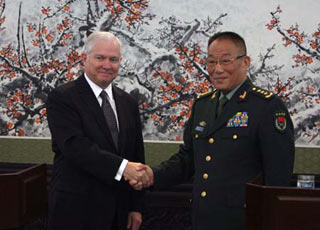China
China, U.S. agree on opening military hot line
WATCH VIDEO
Source: CCTV.com | 11-06-2007 08:38
 |
Chinese Defense Minister Cao Gangchuan (R) and visiting U.S. Secretary of Defense Robert Gates (L) shake hands during a press conference in Beijing, capital of China, Nov. 5, 2007.(Xinhua Photo)
US Defense Secretary, Robert Gates, is in Beijing for talks with Chinese military leaders. Gates described Monday's round as constructive and productive.
The two sides have agreed to open a "direct telephone line" between their Defense ministries, and final technical preparations are now under way.
A sign of the warming ties between the two armed forces.
US Defense Secretary Robert Gates is greeted by Chinese Defense Minister Cao Gangchuan. He is received with the highest military protocol. This is Gates's first visit to China since he was sworn in as Defense Secretary at the end of last year. He is on a three-nation tour which also includes the Republic of Korea and Japan.
Cao Gangchuan and Robert Gates held talks on security and military exchanges.
An agreement has been reached to implement a direct telephone link between the two defense ministries. It is the first time that China has established such a hotline with another country at the defense ministry level.
And Gates attaches much importance to China's role in international affairs.
Robert Gates said, "Cao and I held talks to hold positive momentum and how to use these interactions to improve communications and reduce misunderstandings."
In recent years, there have been tentative moves to strengthen communication between the Chinese and US armed forces. A Chinese delegation was invited for the first time to observe a US military exercise in Guam last year. And the first-ever China-US joint military exercise was also conducted last year, marking a breakthrough in military ties between the two nations. US chief of Naval Operations Mike Mullen and former US Chairman of the Joint Chiefs of Staff Peter Pace have already visited China this year.
But the warming relations face obstacles.
In September, the US announced tentative plans to sell twelve P-3C antisubmarine aircraft and over one hundred and forty cruise missiles to Taiwan. This would be Taiwan's largest purchase of weaponry since the start of the current Bush administration.
Cao Gangchuan said, "The Chinese government will take necessary action, based on the Anti-secession Law, to protect the sovereignty and interests of the nation, as well as to maintain peace and stability across the Taiwan Straits."
China is urging the US to cancel the plans. But such sales to Taiwan are expected to continue.
And there have been major US concerns about Chinese military activities. Washington is calling for more transparency in Chinese defense facilities. The hotline is a sign of China's willingness to cooperate.
On Monday afternoon, Gates met separately with Guo Boxiong and Xu Caihou, Vice Chairmen of the Central Military Commission. His three-day schedule in China includes meetings with Chinese leaders but no visit to any military areas.
Robert Gates' visit is one of an increasing number of high-level exchanges between the Chinese and US militaries. Despite diverging opinions on each side, analysts say such engagement is in the best interests of both countries.
Editor:Zhang Ning



